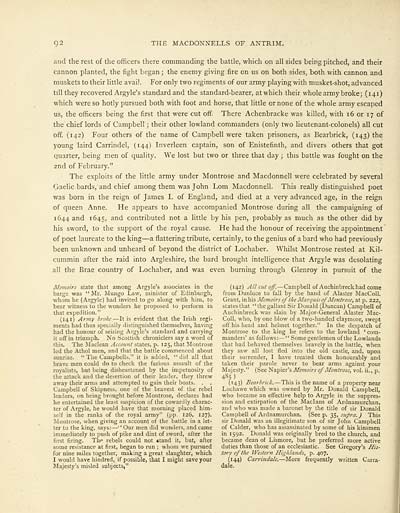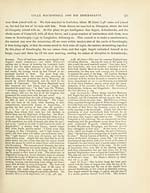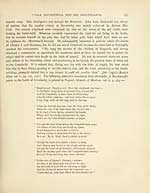Historical account of the Macdonnells of Antrim
(106) Page 92
Download files
Complete book:
Individual page:
Thumbnail gallery: Grid view | List view

9 2
THE MACDONNELLS OF ANTRIM.
and the rest of the officers there commanding the battle, which on all sides being pitched, and their
cannon planted, the fight began ; the enemy giving fire on us on both sides, both with cannon and
muskets to their little avail. For only two regiments of our army playing with musket-shot, advanced
till they recovered Argyle's standard and the standard-bearer, at which their whole army broke; (141)
which were so hotly pursued both with foot and horse, that little or none of the whole army escaped
us, the officers being the first that were cut off. There Achenbracke was killed, with 16 or 17 of
the chief lords of Campbell ; their other lowland commanders (only two lieutenant-colonels) all cut
off. (142) Four others of the name of Campbell were taken prisoners, as Bearbrick, (143) the
young laird Carrindel, (144) Inverleen captain, son of Enistefinth, and divers others that got
quarter, being men of quality. We lost but two or three that day ; this battle was fought on the
2nd of February."
The exploits of the little army under Montrose and Macdonnell were celebrated by several
Gaelic bards, and chief among them was John Lom Macdonnell. This really distinguished poet
was born in the reign of James I. of England, and died at a very advanced age, in the reign
of queen Anne. He appears to have accompanied Montrose during all the campaigning of
1644 and 1645, and contributed not a little by his pen, probably as much as the other did by
his sword, to the support of the royal cause. He had the honour of receiving the appointment
of poet laureate to the king — a flattering tribute, certainly, to the genius of a bard who had previously
been unknown and unheard of beyond the district of Lochaber. Whilst Montrose rested at Kil-
cummin after the raid into Argleshire, the bard brought intelligence that Argyle was desolating
all the Brae country of Lochaber, and was even burning through Glenroy in pursuit of the
Memoirs state that among Argyle's associates in the
barge was "Mr. Mungo Law, minister of Edinburgh,
whom he (Argyle) had invited to go along with him, to
bear witness to the wonders he proposed to perform in
that expedition."
(141) Army broke — It is evident that the Irish regi-
ments had thus specially distinguished themselves, having
had the honour of seizing Argyle's standard and carrying
it off in triumph. No Scottish chroniclers say a word of
this. The Maclean Account states, p. 125, that Montrose
led the Athol men, and that the battle commenced about
sunrise. " The Campbells," it is added, "did all that
brave men could do to check the furious assault of the
royalists, but being disheartened by the impetuosity of
the attack and the desertion of their leader, they threw
away their arms and attempted to gain their boats. . .
Campbell of Skipness, one of the bravest of the rebel
leaders, on being brought before Montrose, declares had
he entertained the least suspicion of the cowardly charac-
ter of Argyle, he would have that morning placed him-
self in the ranks of the royal army" (pp. 126, 127).
Montrose, when giving an account of the battle in a let-
ter to the king, says: — "Our men did wonders, and came
immediately to push of pike and dint of sword, after the
first firing. The rebels could not €tand it, but, after
some resistance at first, began to run ; whom we pursued
for nine miles together, making a great slaughter, which
I would have hindred, if possible, that I might save your
Majesty's misled subjects,"
(142) All cut off. — Campbell of Auchinbreckhad come
from Dunluce to fall by the hand of Alaster MacColl.
Grant, inhis Memoirs of the Marquis of Montrose, at p. 222,
states that "the gallant Sir Donald (Duncan) Campbell of
Auchinbreck was slain by Major-General Alaster Mac-
Coll, who, by one blow of a two-handed claymore, swept
off his head and helmet together." In the despatch of
Montrose to the king he refers to the lowland ' com-
manders' as follows: — " Some gentlemen of the Lowlands
that had behaved themselves bravely in the battle, when
they saw all lost fled into the old castle, and, upon
their surrender, I have treated them honourably and
taken their parole never to bear arms against your
Majesty." (See Napier's Memoirs of Montrose, vol. ii. , p.
485)
(143) Bearbrick. — This is the name of a property near
Lochawe which was owned by Mr. Donald Campbell,
who became an effective help to Argyle in the suppres-
sion and extirpation of the Maclans of Ardnamurchan,
and who was made a baronet by the title of sir Donald
Campbell of Ardnamurchan. (See p. 35, supra.) This
sir Donald was an illegitimate son of sir John Campbell
of Calder, who has assassinated by some of his kinsmen
in 1592. Donald was originally bred to the church, and
became dean of Lismore, but he preferred more active
duties than those of an ecclesiastic. See Gregory's His-
tory of the Western Highlands, p. 407.
(144) Carrindale. — More frequently written Carra-
dale.
THE MACDONNELLS OF ANTRIM.
and the rest of the officers there commanding the battle, which on all sides being pitched, and their
cannon planted, the fight began ; the enemy giving fire on us on both sides, both with cannon and
muskets to their little avail. For only two regiments of our army playing with musket-shot, advanced
till they recovered Argyle's standard and the standard-bearer, at which their whole army broke; (141)
which were so hotly pursued both with foot and horse, that little or none of the whole army escaped
us, the officers being the first that were cut off. There Achenbracke was killed, with 16 or 17 of
the chief lords of Campbell ; their other lowland commanders (only two lieutenant-colonels) all cut
off. (142) Four others of the name of Campbell were taken prisoners, as Bearbrick, (143) the
young laird Carrindel, (144) Inverleen captain, son of Enistefinth, and divers others that got
quarter, being men of quality. We lost but two or three that day ; this battle was fought on the
2nd of February."
The exploits of the little army under Montrose and Macdonnell were celebrated by several
Gaelic bards, and chief among them was John Lom Macdonnell. This really distinguished poet
was born in the reign of James I. of England, and died at a very advanced age, in the reign
of queen Anne. He appears to have accompanied Montrose during all the campaigning of
1644 and 1645, and contributed not a little by his pen, probably as much as the other did by
his sword, to the support of the royal cause. He had the honour of receiving the appointment
of poet laureate to the king — a flattering tribute, certainly, to the genius of a bard who had previously
been unknown and unheard of beyond the district of Lochaber. Whilst Montrose rested at Kil-
cummin after the raid into Argleshire, the bard brought intelligence that Argyle was desolating
all the Brae country of Lochaber, and was even burning through Glenroy in pursuit of the
Memoirs state that among Argyle's associates in the
barge was "Mr. Mungo Law, minister of Edinburgh,
whom he (Argyle) had invited to go along with him, to
bear witness to the wonders he proposed to perform in
that expedition."
(141) Army broke — It is evident that the Irish regi-
ments had thus specially distinguished themselves, having
had the honour of seizing Argyle's standard and carrying
it off in triumph. No Scottish chroniclers say a word of
this. The Maclean Account states, p. 125, that Montrose
led the Athol men, and that the battle commenced about
sunrise. " The Campbells," it is added, "did all that
brave men could do to check the furious assault of the
royalists, but being disheartened by the impetuosity of
the attack and the desertion of their leader, they threw
away their arms and attempted to gain their boats. . .
Campbell of Skipness, one of the bravest of the rebel
leaders, on being brought before Montrose, declares had
he entertained the least suspicion of the cowardly charac-
ter of Argyle, he would have that morning placed him-
self in the ranks of the royal army" (pp. 126, 127).
Montrose, when giving an account of the battle in a let-
ter to the king, says: — "Our men did wonders, and came
immediately to push of pike and dint of sword, after the
first firing. The rebels could not €tand it, but, after
some resistance at first, began to run ; whom we pursued
for nine miles together, making a great slaughter, which
I would have hindred, if possible, that I might save your
Majesty's misled subjects,"
(142) All cut off. — Campbell of Auchinbreckhad come
from Dunluce to fall by the hand of Alaster MacColl.
Grant, inhis Memoirs of the Marquis of Montrose, at p. 222,
states that "the gallant Sir Donald (Duncan) Campbell of
Auchinbreck was slain by Major-General Alaster Mac-
Coll, who, by one blow of a two-handed claymore, swept
off his head and helmet together." In the despatch of
Montrose to the king he refers to the lowland ' com-
manders' as follows: — " Some gentlemen of the Lowlands
that had behaved themselves bravely in the battle, when
they saw all lost fled into the old castle, and, upon
their surrender, I have treated them honourably and
taken their parole never to bear arms against your
Majesty." (See Napier's Memoirs of Montrose, vol. ii. , p.
485)
(143) Bearbrick. — This is the name of a property near
Lochawe which was owned by Mr. Donald Campbell,
who became an effective help to Argyle in the suppres-
sion and extirpation of the Maclans of Ardnamurchan,
and who was made a baronet by the title of sir Donald
Campbell of Ardnamurchan. (See p. 35, supra.) This
sir Donald was an illegitimate son of sir John Campbell
of Calder, who has assassinated by some of his kinsmen
in 1592. Donald was originally bred to the church, and
became dean of Lismore, but he preferred more active
duties than those of an ecclesiastic. See Gregory's His-
tory of the Western Highlands, p. 407.
(144) Carrindale. — More frequently written Carra-
dale.
Set display mode to:
![]() Universal Viewer |
Universal Viewer | ![]() Mirador |
Large image | Transcription
Mirador |
Large image | Transcription
Images and transcriptions on this page, including medium image downloads, may be used under the Creative Commons Attribution 4.0 International Licence unless otherwise stated. ![]()
| Histories of Scottish families > Historical account of the Macdonnells of Antrim > (106) Page 92 |
|---|
| Permanent URL | https://digital.nls.uk/95342519 |
|---|
| Description | A selection of almost 400 printed items relating to the history of Scottish families, mostly dating from the 19th and early 20th centuries. Includes memoirs, genealogies and clan histories, with a few produced by emigrant families. The earliest family history goes back to AD 916. |
|---|

